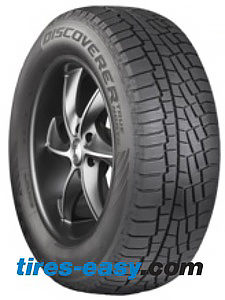Last Updated on August 3, 2025
Unlocking the Secrets of Winter Tires’ Lifespan
Maximizing Durability & Performance
If you recently bought a new set of winter tires, or your winter tires are a few years old, other than safety, your biggest concern is probably how long these tires will last. Knowing how to get the most mileage out of your winter tires will save you money while keeping you safe no matter how tough the winter weather becomes.
How many seasons or miles will I get from my winter tires?
While snow tires have no “life expectancy,” many manufacturers estimate that you should get four seasons of wear from a set of winter tires. Tread wear on winter tires will depend heavily on how many miles you drive each month, whether those miles are primarily on snow or ice-covered roads or if you routinely have a mix of snow and frozen dry roads.
The tread will wear more quickly if the tire runs on freezing road surfaces than if it is on snow for most of the season. Low-mileage drivers will get much longer use out of their winter tires than drivers with long winters and driving distances. The lifespan of your tire will also be directly related to the original quality of the tire and the level of care it’s given.
Winter Tires Lifespan: How Long Do They Last?
Winter tires, often revered for life-saving capabilities on icy roads, are a must-have for many motorists braving the snowy months. But just how long can one expect these specialized tires to last? Let’s delve into the lifespan of winter tires and the various factors that play a part in their longevity.
Factors Influencing the Lifespan of Winter Tires
- Driving Habits: Aggressive driving can decrease a winter tire’s lifespan like all tires. Smooth accelerations, turns, and stops can add life to your tires.
- Proper Storage: When not in use, winter tires should be stored in a cool, dry place, away from direct sunlight, to prevent premature aging.
- Tire Pressure Maintenance: Regularly checking and maintaining the correct tire pressure ensures even tire wear and extends life.
- Road Conditions: Frequently driving on rough or icy roads can cause quicker wear on the tires.
- Tire Rotations: Regularly rotating winter tires can extend lifespan by ensuring even wear.
Tips to Extend the Life of Your Winter Tires
- Regularly Inspect for Damage: Check for any cuts, punctures, or visible wear.
- Align Your Wheels: Misaligned wheels can lead to uneven tire wear.
- Avoid Overloading: Always stick to your vehicle’s recommended load capacity.

How to Care for Your Winter Tires
Taking care of your winter tires is crucial in ensuring longevity and optimizing performance. Here’s how you can maximize the winter tires:
- Seasonal Usage: Only use winter tires during appropriate seasons to prevent unnecessary wear.
- Proper Storage: When not used, store them in a cool, dry place away from direct sunlight to prevent rubber degradation.
- Regular Maintenance: Check tire pressure monthly, as cold temperatures can lead to pressure fluctuations.
- Inspect for Wear: Look for signs of uneven wear or damage. Rotate tires if necessary to ensure even wear.
- Avoid High Speeds: Excessive high-speed driving can wear down winter tires faster than normal driving conditions.
- Proper Loading: Avoid overloading your vehicle, as it puts extra stress on the tires.
- Immediate Response: If you notice any issues, address them promptly. This includes getting professional checks if unsure.
By diligently following these steps, you can ensure a prolonged lifespan for your winter tires, saving money and ensuring safety during icy conditions.
Storage of Winter Tires
Changing your winter tires for summer or all-season tires would be best when temperatures are regularly above 42 degrees.
Leaving winter tires on when temperatures get warmer will increase wear since the compounds that allow a winter tire to stay flexible in freezing temperatures also wear faster on warm roads.
High heat, freezing temperatures, and exposure to light are the most significant contributors to any tire’s aging process. We recommend storing your tires indoors, protecting them from temperature fluctuations.
Be sure to clean the tires thoroughly and ensure they are dry. An airtight tire storage bag is best; believe it or not, heavy-duty black trash bags can be a good tire storage solution. Remove as much air as possible from the bag and securely close the bag. Ideally, your tires are cool and dry while stored, so avoid storing tires near a water heater or radiator.
Is it Time for New Winter Tires?
Age and tread wear will eventually be the indicators of when it’s time to begin shopping for new winter tires. Unlike an all-season or summer tire, winter tires need a much deeper tread to be effective and safe.
The first thing you should do when pulling out your winter tires for the first time each season is check tread depth. If your tires have a tread depth of 5/32 or lower, it’s time for a new set.
There will not be enough tread remaining to get you through the winter. Winter tire tread patterns and siping are designed to bite into and evacuate snow and slush, so that extra tread depth will provide your best traction on the road.
If you don’t have a tire tread gauge handy, most modern snow tires have built-in wear indicators. Usually, they’re molded into the bottom of a tire’s tread grooves, indicating that a tire needs to be replaced when the indicator is flush with the adjacent ribs.
You should also always check your tires for visible damage that may indicate it’s time for a new set. Look for deep cracks in the rubber and sidewall damage, and replace all four tires if you find significant damage.
Conclusion
In conclusion, the winter tires’ lifespan varies based on driving habits, road conditions, and maintenance practices. While manufacturers typically suggest a lifespan of 3 to 5 years for winter tires, regular care and proper usage can extend this duration.
It’s essential to monitor your tires’ condition and ensure they remain effective in providing safety and performance. Investing time in proper tire maintenance can lead to a longer and safer winter driving experience.
Ready for the snowy season?
Explore our range of top-notch winter tires and BUY the best for your vehicle from Tires Easy. Your safety on the road is our top priority.
FAQs
How long do winter tires last on average?
On average, the lifespan of winter tires ranges between 3 to 5 years, depending on factors like driving habits, road conditions, and regular maintenance. It’s essential to check the tread depth and overall condition to determine their effectiveness.
Are winter tires still good after ten years?
While some winter tires might appear in decent condition after ten years, most manufacturers recommend replacing tires that are a decade old, regardless of their visible condition. Rubber compounds can degrade over time, affecting the winter tires’ lifespan and performance.
Do winter tires wear out?
Yes, like all tires, winter tires wear out over time. Factors contributing to wear include driving conditions, distances covered, and driving habits. Regularly monitoring tread depth and looking for signs of aging can help determine when they need replacement.
How often do you change winter tires?
The frequency of changing winter tires depends on their usage and condition. Generally, if you drive regularly in snowy or icy conditions, you should inspect your tires annually. However, based on the winter tires’ lifespan, it’s advisable to consider replacing them every 3 to 5 years for optimum performance and safety.
-
Automotive Specialist
-
Proofreader
-
Writer










